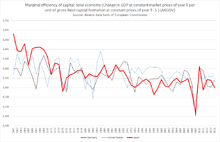Incremental capital-output ratio
The Incremental Capital-Output Ratio (ICOR), is the ratio of investment to growth which is equal to 1 divided by the marginal product of capital. The higher the ICOR, the lower the productivity of capital or the marginal efficiency of capital. The ICOR can be thought of as a measure of the inefficiency with which capital is used. In most countries the ICOR is in the neighborhood of 3. It is a topic discussed in Economic growth.

K: capital stock
Y: output (GDP)
I: net investment
According to this formula the incremental capital output ratio can be computed by dividing the investment share in GDP by the rate of growth of GDP.
ICOR, world, and determining variables
-
Investment share
-
Rate of GDP growth
-
The reciprocal of ICOR
-

Marginal efficiency of capital as defined in the Ameco data bank of the European Commission for FRG, USA and Japan.
Further reading
- Reinhart, Carmen M. "Comment" on Giancarlo Corsetti, Paolo Pesenti, and Nouriel Roubini: "Fundamental Determinants of the Asian Crisis: The Role of Financial Fragility and External Imbalances", in Takatoshi Ito and Anne Krueger, eds. Regional and Global Capital Flows: Macroeconomic Causes and Consequences (Chicago: University of Chicago Press for the NBER, 2001), 42–45. ISBN 9780226386768. OCLC 45314551.